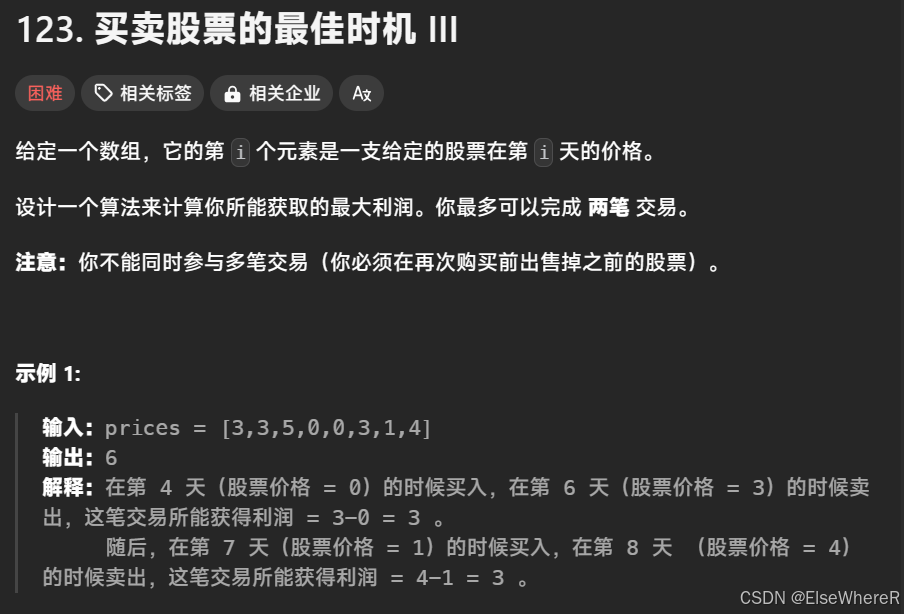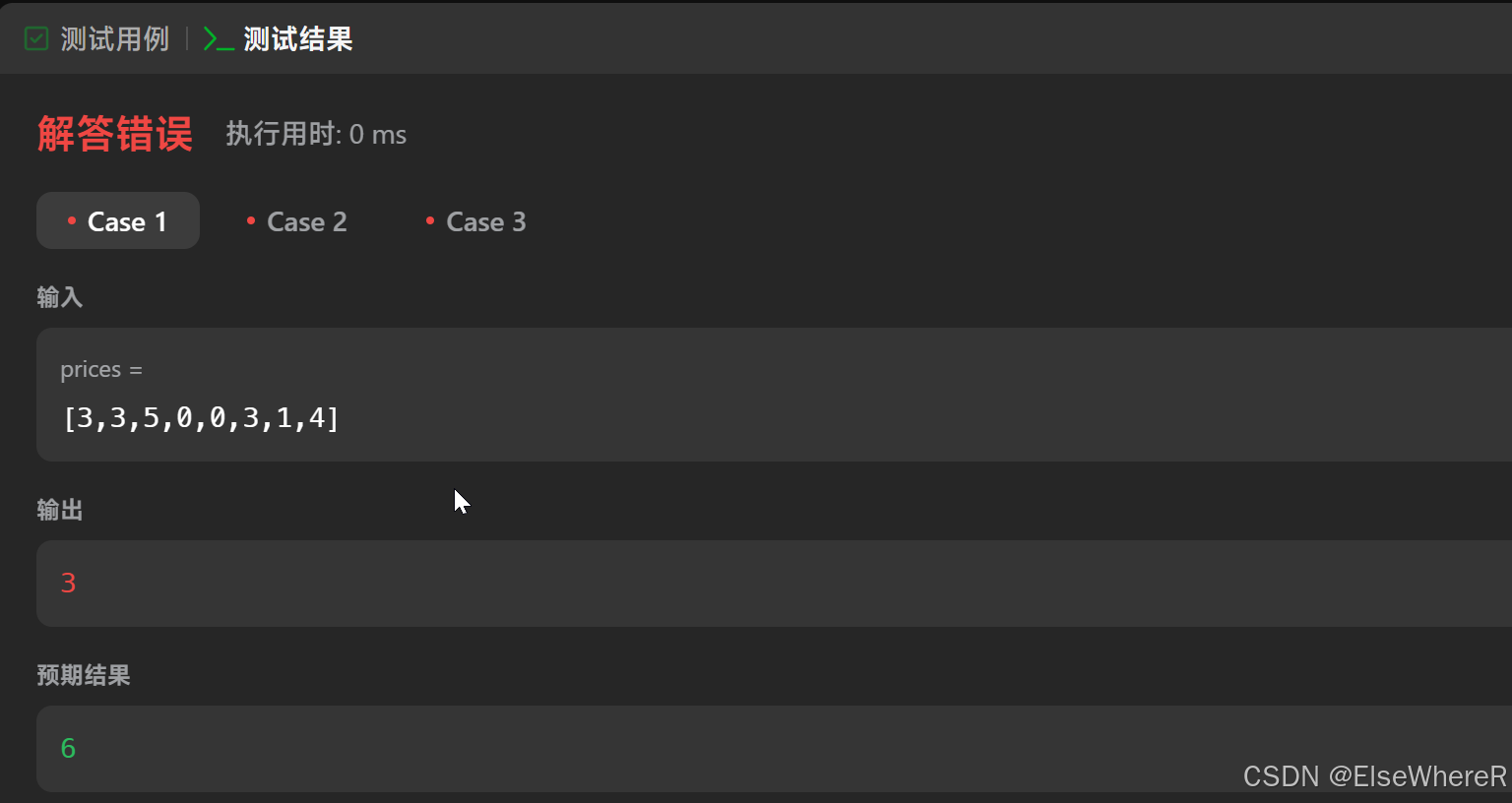*************
C++
topic: 123. 买卖股票的最佳时机 III - 力扣(LeetCode)
*************
Check the topic:
|
|
Yeaterday I bought a stock too:
 |
In yesterday project, times to deal is free while todays deal-time-limitation is two. It seems nothing familar.
What if the deal time is only once? Then it comes easy, just find the minimum price and find the max profit:
class Solution {
public:
int maxProfit(vector<int>& prices) {
int minPrice = prices[0]; // 迄今为止遇到的最低价格
int maxPro = 0; // 最大利润
for (int i = 1; i < prices.size(); ++i) {
// 如果当前价格比迄今为止的最低价格还低,更新最低价格
if (prices[i] < minPrice) {
minPrice = prices[i];
} else {
// 如果当前价格比最低价格高,计算利润,并更新最大利润
maxPro = max(maxPro, prices[i] - minPrice);
}
}
return maxPro;
}
};If the deal-time is not limited, like yesterday topic:
class Solution {
public:
int maxProfit(vector<int>& prices) {
int maxPro = 0; // 最大利润
for (int i = 1; i < prices.size(); ++i) {
// 如果今天的价格比昨天高,那么我们就可以认为昨天买入今天卖出
if (prices[i] > prices[i - 1]) {
maxPro += prices[i] - prices[i - 1];
}
}
return maxPro;
}
};and now, the deal-time is two. And the first sale is the same, find the min price to buy and the max price to sale:
class Solution {
public:
int maxProfit(vector<int>& prices) {
int n = prices.size();
// 第一次买入和卖出的最大利润
int firstBuy = -prices[0], firstSell = 0;
for (int i = 1; i < n; ++i) {
// 更新第一次买入的最大利润
firstBuy = max(firstBuy, -prices[i]);
// 更新第一次卖出的最大利润
firstSell = max(firstSell, firstBuy + prices[i]);
}
};here do a little change:
// 如果当前价格比迄今为止的最低价格还低,更新最低价格
if (prices[i] < minPrice) {
minPrice = prices[i];the code here can be more concise like this:
// 如果当前价格比迄今为止的最低价格还低,更新最低价格
if (prices[i] < minPrice) {
minPrice = prices[i];
//
int firstBuy = -price[0]
firstBuy = max(firstBuy, -prices[i]);Just some mathematic tricks.
For the second deal, the second min buy price is:
secondBuy = max(secondBuy, firstSell - prices[i]);For your attention, sale and buy are allowed to happen at the same day.
So the second sale is :
secondSell = max(secondSell, secondBuy + prices[i]);The code is easy to write:
get the length always comes first:
class Solution {
public:
int maxProfit(vector<int>& prices) {
int n = prices.size(); // get the length
}
};Then comes initializing:
class Solution {
public:
int maxProfit(vector<int>& prices) {
int n = prices.size(); // get the length
int firstBuy = - prices[0];
int firstSale = 0;
int secondBuy = - prices[0];
int secondSale = 0;
// do sth. here
}
};Find the minimum price in the i day:
class Solution {
public:
int maxProfit(vector<int>& prices) {
int n = prices.size(); // get the length
int firstBuy = prices[0];
int firstSale = 0;
int secondBuy = prices[0];
int secondSale = 0;
// do sth. here
for (int i = 1; i < n; i++){
firstBuy = min(firstBuy, prices[i]);
firstSale = max(firstSale, first - prices[i]);
}
}
};After the first sale comes the second sale:
class Solution {
public:
int maxProfit(vector<int>& prices) {
int n = prices.size(); // get the length
int firstBuy = prices[0];
int firstSale = 0;
int secondBuy = prices[0];
int secondSale = 0;
// do sth. here
for (int i = 1; i < n; i++){
firstBuy = min(firstBuy, prices[i]);
firstSale = max(firstSale, firstSale - prices[i]);
// the second sale
secondBuy = min(secondBuy, firstSale - prices[i]);
secondSale = max(secondSale, prices[i] - secondSale);
}
return secondSale;
}
};but the code doesnot run:
|
|
Inspect the code then find the logic is something wrong: every step means the maxprofit, not the price. All the firstBuy and firstSale should be the benefits:
- if buy, the profit should be - price[i]
- if sale, the profit should be sale - price[i]
and makes the code more elegant:
class Solution {
public:
int maxProfit(vector<int>& prices) {
int n = prices.size(); // get the length
int firstBuy = - prices[0];
int firstSale = 0;
int secondBuy = - prices[0];
int secondSale = 0;
// do sth. here
for (int i = 1; i < n; i++){
firstBuy = max(firstBuy, - prices[i]);
firstSale = max(firstSale, prices[i] + firstBuy);
// the second sale
secondBuy = max(secondBuy, firstSale - prices[i]);
secondSale = max(secondSale, prices[i] + secondBuy);
}
return secondSale;
}
};It works.
And if the dael time is 3 times:
class Solution {
public:
int maxProfit(vector<int>& prices) {
if (prices.empty()) return 0;
int n = prices.size();
// 初始化状态变量
int firstBuy = -prices[0]; // 第一次买入的最大利润
int firstSell = 0; // 第一次卖出的最大利润
int secondBuy = -prices[0]; // 第二次买入的最大利润
int secondSell = 0; // 第二次卖出的最大利润
int thirdBuy = -prices[0]; // 第三次买入的最大利润
int thirdSell = 0; // 第三次卖出的最大利润
for (int i = 1; i < n; ++i) {
// 更新第一次买入的最大利润
firstBuy = max(firstBuy, -prices[i]);
// 更新第一次卖出的最大利润
firstSell = max(firstSell, firstBuy + prices[i]);
// 更新第二次买入的最大利润
secondBuy = max(secondBuy, firstSell - prices[i]);
// 更新第二次卖出的最大利润
secondSell = max(secondSell, secondBuy + prices[i]);
// 更新第三次买入的最大利润
thirdBuy = max(thirdBuy, secondSell - prices[i]);
// 更新第三次卖出的最大利润
thirdSell = max(thirdSell, thirdBuy + prices[i]);
}
return thirdSell;
}
};
Some where in the world that aren't made out of stone, there's something inside them that they can't get to, that they can't touch. That's yours.



























 被折叠的 条评论
为什么被折叠?
被折叠的 条评论
为什么被折叠?








